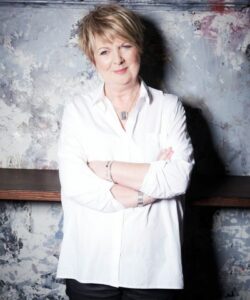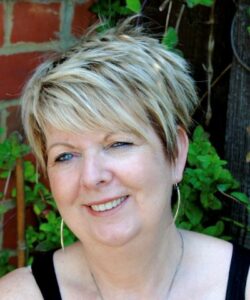Fiona Talkington – Reading graduate and one of BBC Radio 3’s longest serving presenters – has been awarded an honorary degree by the University of Reading. She sat down with CONNECTED to talk about her career and her work in the community.
 Fiona has had a long and meaningful relationship with the University of Reading. Growing up close to Whiteknights Campus, Fiona recalls sitting on her windowsill as a child watching the students parade by in Bonfire Night celebrations. Fiona then went on to work for the University as their Concerts Organiser, before beginning her successful radio career and returning to the University as a master’s student, studying MA in English Literature and the Visual Arts.
Fiona has had a long and meaningful relationship with the University of Reading. Growing up close to Whiteknights Campus, Fiona recalls sitting on her windowsill as a child watching the students parade by in Bonfire Night celebrations. Fiona then went on to work for the University as their Concerts Organiser, before beginning her successful radio career and returning to the University as a master’s student, studying MA in English Literature and the Visual Arts.
Now, back living in the same house she grew up in, Fiona loves to frequent the campus for leisurely walks around the lake, or to visit the fruit and vegetable market. She tells CONNECTED what the honorary doctorate degree means to her. She shared:
“I feel a real sense of belonging on campus and that feeling became even stronger when I was awarded this honorary degree.”
“I was actually on the Whiteknights Campus when I received the email letting me know about it. I was thrilled! I thought of my mum [who had also worked for the University] and how she would be so proud – it was such a beautiful day and I just thought, I belong here. Having grown up in Reading and been connected to the University for so long, it makes it that extra bit special.
“Every September I notice the new students arriving and I think to myself – I hope they realise they are coming to an incredibly beautiful campus and a special place.
“The University and the town can be everything you want it to be and I’m lucky to remain connected with such a special university and community.”
Read on to find out more about Fiona’s radio career and her inspirational voluntary work.
Three decades of radio
Fiona has been a BBC Radio 3 presenter for over 30 years and is best-known for the award-winning Late Junction show which brought unfamiliar music genres to listeners.
Fiona explained how her radio career took off: “When I was working as the Concerts Organiser in the former Department of Music at Reading I got to know the presenters on the local station, Radio 210 [which went on to become 2-Ten FM and is now Heart Radio].
“When it was suggested that I present a show I initially laughed it off, but was eventually persuaded. Radio is such an intimate medium – you have an audience and you want to play them some music, and it came naturally to me. I presented a classical music show called Masterworks. Radio 210 was a very engaging local station with mostly pop music throughout the day, then it had specialist shows like rock and classical in the evenings.
“After a few years I moved to BBC Radio 3 to do the drivetime evening classical show between 5-7pm, called Mainly For Pleasure. Suddenly I found myself on national radio!
“Over 30 years later I’m still there and have presented just about every show on the station, including live concerts from the Proms at the Royal Albert Hall, festivals and documentaries.”
In 1999 Fiona began a new late-night show on BBC Radio 3 which made quite an impact on the music world: the award-winning Late Junction was born!
She said: “There were two of us presenting, live, four nights a week – it was a lot of hard work but the response was amazing. We were playing music that wasn’t being played anywhere else on UK radio: music from around the world including jazz, folk, experimental, classical and beyond. This was pre-streaming days of course – there was no BBC Sounds then – and listeners were desperate to find out what we were playing.
“People were hearing completely new things and being inspired. We would segue from say, Norwegian fiddle music to perhaps an African kora, to a piano solo and surprise our listeners.
“I think this show gave permission for other programmes to experiment and break outside their prescribed genres.”
Building relationships
 Beyond the studio, Fiona has spent more than two decades cultivating relationships between the art scenes in Norway and the UK. She curated a three-year programme called conexions, which led to concert exchanges between the two countries, and saw her efforts recognised with the prestigious Royal Norwegian Order of Merit in 2009.
Beyond the studio, Fiona has spent more than two decades cultivating relationships between the art scenes in Norway and the UK. She curated a three-year programme called conexions, which led to concert exchanges between the two countries, and saw her efforts recognised with the prestigious Royal Norwegian Order of Merit in 2009.
She said: “I’ve always been interested in alternative music and music from other countries, but my connections to Norway began when I met a Norwegian band whilst on a work trip to America. We became good friends and they invited me to visit them.
“Norway has a relatively small population so it is true that everyone knows everyone, and it’s got a really vibrant arts scene. I remember my first visit to Oslo, I went to a gig and met musicians, dancers, actors, writers, and sound engineers all in one night.
“I built up relationships with musicians from many backgrounds, as well as with festivals and venues, and got to know people and fell in love with their music.
“I started to play their music on Late Junction and the Norwegian Embassy in the UK got in touch and offered to help me make even more contacts. Everywhere I went I made friendships across the arts. Then I was asked to curate the conexions series, which brought British and Norwegian musicians together for concerts. It was a pleasure to see how this series gave musicians the chance to develop and achieve success with their music.”
Closer to home, Fiona is also involved with her local community in Reading. “I support the Reading Refugee Support Group [RRSG] and have worked with them in various ways: I co-hosted their 25th anniversary gala at the Town Hall, and in 2019 I hosted a Conversations with Refugees event at the Reading Fringe Festival,” she explained.
“It was very moving to hear some of the participants telling their stories about their lives and how they came to make their new homes in Reading.
“Recently I supported RRSG with holding writing workshops for their recent play Where Do We Go To From Here and with recording audio trails for both Reading Museum and the Museum of English Rural Life [MERL].
“It’s deeply humbling to work with a group of people who’ve been through the most unspeakable trauma, and yet in that room you hold their trust in your hand. I get far more out of working with the refugee group than they get from me. They are incredible people.”
Finding an outlet
Fiona is now working on an afternoon BBC Radio 3 show and shared that in the last few years her life has taken a slightly new direction.
She said: “I’ve recently completed a Master’s degree in Creative Writing for Therapeutic Purposes. I’ve been writing for years – radio scripts, contributing chapters to books, and reviews – but I’ve rarely had the chance to really explore my own writing.
“I chose to focus on writing for therapeutic purposes because of my strong belief in the importance of the arts in our lives. My dissertation was an autoethnography focussing on the expressions and communication of neuropathic pain, which I’ve had since my treatment for breast cancer.
“I’m now a lived experience representative for a pain research group headed up by Oxford University, called PAINSTORM, and I present their podcast. This degree and work is very personal for me, as it helped me learn to communicate and express not just pain, but to explore all sorts of writing and working towards facilitating writing groups of all kinds.
“Whether it be broadcasting, writing, communicating, music or working with the pain research group – everything I do is connected across the arts and acts as an outlet for my personal feelings. Everything ties in for me.”
Find out more about the conexions series, or listen to Fiona introducing one of the conexions concerts. You can listen to the PAINSTORM team’s podcast here, called PAINCAST.
Read about some of the other inspiring women from our alumni community, or share your own story with us.




